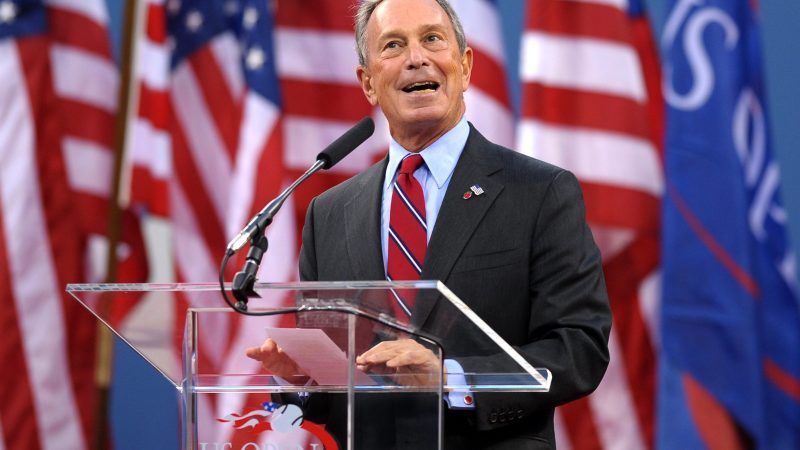Michael Bloomberg and the Imperious Presidency
Rules are for the little people, not the eighth richest man on the planet.

If Donald Trump could shoot somebody in the middle of Fifth Avenue and get away with it, what bit of brazenness might we expect from his fellow septuagenarian Manhattanite presidential candidate Michael Bloomberg?
The then-mayoral candidate gave us a glimpse back in 2001, when he was dumping his first tranche of $74 million into a late-in-life political career and a reporter asked him whether he had ever smoked marijuana. "You bet I did," the media mogul enthused, at a time when politicians tended to be much more reticent about such things. "And I enjoyed it."
Talk about do as I say, not as I did. During Bloomberg's three terms as mayor, the Big Apple became the marijuana arrest capital of the world, thanks to the notorious stop-and-frisk searches in neighborhoods where billionaires rarely venture.
Hizzoner's conscience has never been noticeably clouded by such obvious disparities under the law. If anything, the disproportionate impact of his policy preferences on poorer folk has been the point.
In an April 2018 conversation with Christine Lagarde, then the managing director of the International Monetary Fund, Bloomberg defended his fondness for taxing items, such as sugary sodas and trans fats, that are widely enjoyed by the non-rich.
"Some people say, well, taxes are regressive," he said. "But in this case, yes they are! That's the good thing about them, because the problem is in people that don't have a lot of money. And so, higher taxes should have a bigger impact on their behavior and how they deal with themselves….The question is, do you want to pander to those people, or do you want to get them to live longer?"
Rules may be important for "those people," but much less so for the eighth richest man on the planet. He is the leading financier of gun control advocacy in America—and one of the few people allowed to have an armed security detail in Bermuda. He has been positively Trumpian about releasing his tax returns, snapping at the mere suggestion that such political traditions should apply to him. And as recently as January 2019, even as the rest of the Democratic Party was finally evolving toward getting rid of federal prohibitions on the marijuana Bloomberg once enjoyed, he called pot legalization "perhaps the stupidest thing we've ever done."
If George W. Bush and Barack Obama ushered in the return of the imperial presidency, Trump represents a further devolution toward the imperious presidency. There was an audacity in Obama's pen and phone, and there was an expansive theory of executive branch autonomy spearheaded by former vice president Dick Cheney. Trump's contribution has been more vulgar, more direct, more New York: I dare you to stop me mixed with I can say anything I want.
Bloomberg's manners are more refined, but only just. There's the locker-room talk about women, already apologized for in advance of his presidential run. (To imagine how much teeth-clenching he must be doing through his mea culpa rounds, watch this video from March of Bloomberg mocking Joe Biden's "apology tour" and saying he wouldn't be able to run for president "unless I was willing to change all my views.") Trump may troll people about seeking a legally proscribed third term, but Bloomberg actually went there, changing the law near the end of his second term and then switching it back soon thereafter. As The New York Times noted dryly upon the latter occasion, "Bloomberg thinks that being able to serve three terms in office is a good idea—just not for anyone else."
Mayor Mike's above-the-law demeanor, compared to Trump's, seems far less pegged to the kinds of corruptions in office that have landed the president on the precipice of impeachment. But their approaches to how the law applies to the lowly are distressingly similar.
To the president, constitutional rights are speed bumps slowing down his policy goals, especially concerning immigration. To Bloomberg, apology tour notwithstanding, policy ends can justify means that judges have explicitly ruled unconstitutional. "I think people, the voters, want low crime," he told The New York Times in September 2018, defending the legal setbacks of stop-and-frisk. "They don't want kids to kill each other."
It seems implausible that, in an era of resurgent Democratic populism, primary voters will reward the kind of bluenose who has appeared in skits as "King Michael," dispensing positive policy outcomes to a grateful peasantry. But seeing Bloomberg even in fifth place extends a worrying trend. We've stacked up so much power at 1600 Pennsylvania Ave. that billionaires with insatiable ambitions are eyeing the address greedily and finding market share among understandably disgruntled voters.
"The president," lawyer Alan Dershowitz said last month, "has the power that kings have never had." Until we start denuding the Oval Office, we will continue getting the royals we deserve.


Show Comments (53)